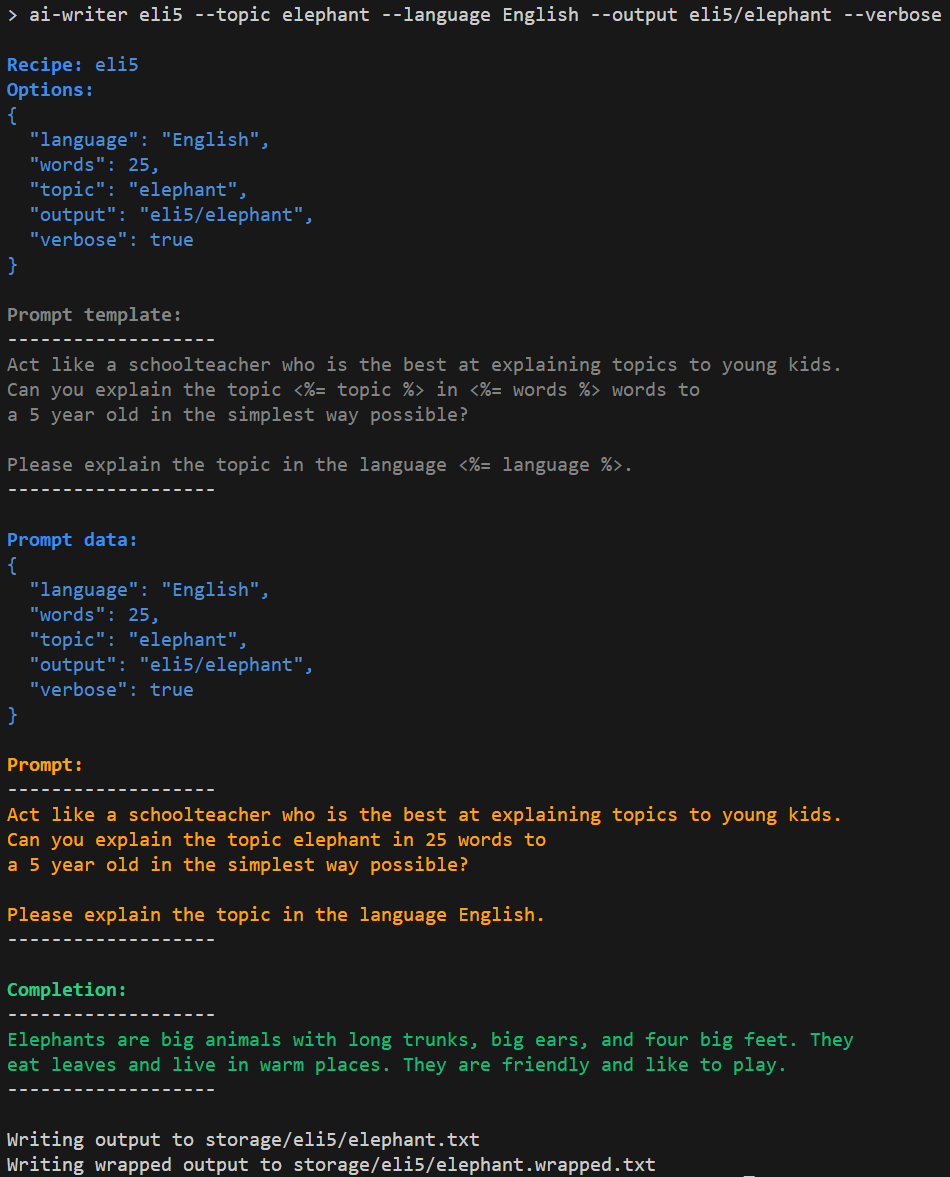Executing a recipe
A recipe can either be executed from the command line or a script. Execution of a recipe for the command line in a terminal window is to execute a single recipe and all the required options must be specified manually. Execution of a recipe from a script can be used to configure (part of) the options in the script. There is however a way more interesting case of using scripts. With a script, it is possible to automate the execution of multiple recipes, and let one recipe use the output of another recipe! With scripts, you can cook yourself a complete meal!
The simplest way is to execute a recipe from the command line. For example, to execute the eli5 recipe, execute the following command:
npx ai-writer eli5 --topic elephant --output eli5/elephant
The npx command is used to execute the ai-writer command. The ai-writer command is used to execute a recipe. The eli5 recipe is executed with the --topic option to specify the topic of the recipe. The --output option is used to specify the output file of the recipe.
Available recipes in the project
To see all available recipes in your project, execute the following command:
npx ai-writer
Get help with a recipe
To get help on a recipe, execute the following command:
npx ai-writer <recipe> --help
The output of a recipe
To specify the output of a recipe, use the mandatory --output option. The --output option can be used to specify the output file. This file will not contain the extension, and the path is relative to the storage folder. For example, to specify the output of the eli5 recipe, execute the following command:
npx ai-writer eli5 --topic elephant --output eli5/elephant
The extension will be .txt by default but can be overridden using the --output-format option. For example, to specify the output of the eli5 recipe as a Markdown file, execute the following command:
npx ai-writer eli5 --topic elephant --output eli5/elephant --output-format md
In that case the output file will be eli5/elephant.md. Supported output formats must be defined in the output-formats.json file. See the output-formats.json page for more information.
See the recipe output in the CLI
To see the output of a recipe in the CLI, use the --show-output option. For example, to see the output of the eli5 recipe in the CLI, execute the following command:
npx ai-writer eli5 --topic elephant --output eli5/elephant --show-output
This will show the wrapped output of the recipe in the CLI, and will also write the output to a file.
Dry-run a recipe
Execution of a recipe makes a call to the OpenAI API, which costs money and takes time. To prevent this, use the --dry-run option. For example, to dry-run the eli5 recipe, execute the following command:
npx ai-writer eli5 --topic elephant --output eli5/elephant --show-output --dry-run
This option is very useful during the development of the perfect prompt.
Note that the --dry-run option automatically enables the --verbose option as well for more information.
When the --dry-run option is used, the output is:
Dry-run completion on prompt:
<prompt>
Overriding the model configuration
A recipe has a default model configuration as defined in the file models.json. This model configuration can be overridden using the --model-override option. For example, to override the model configuration of the eli5 recipe, execute the following command:
npx ai-writer eli5 --topic elephant --output eli5/elephant --model-override azure-gpt-35
The available models are defined in the models.json file. See the models.json page for more information. This option is very useful for testing out the results of other models (e.g. gpt-4 versus gpt-3.5-turbo versus text-davinci-003), but also because Azure OpenAI Service and OpenAI use different model names for the same model.
Verbose and debug output
To see what is exactly happening during the execution of a recipe, use the --verbose option. For example, to see the verbose output of the eli5 recipe, execute the following command:
npx ai-writer eli5 --topic elephant --output eli5/elephant --verbose
The output will show the following:

Note the used colors, each color has a meaning as described in Colors.
To see even more details, use the --debug option. For example, to see the debug output of the eli5 recipe, execute the following command:
npx ai-writer eli5 --topic elephant --output eli5/elephant --debug
The debug output will show the verbose output and more.
See also
For more advanced scenaries also have a look into: